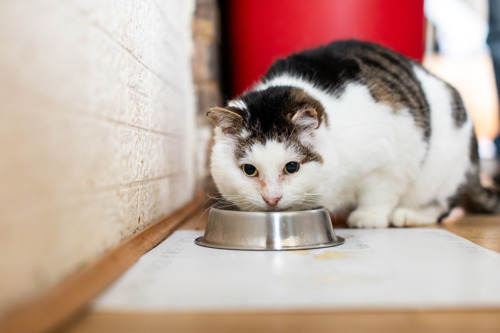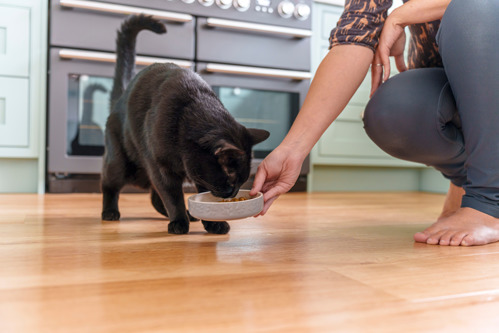The elderly cat diet that will keep your older cat healthy
A cat’s health and appetite can change as they get older. It’s important to make sure you are feeding them the correct food to keep them healthy.
Most cat food brands make food specially designed for senior cats, with altered ingredients to suit their life stage. Cats are generally considered senior when they reach 11 years old.

Always make sure you are feeding your cat a ‘complete’ cat food. It should say ‘complete’ on the packaging. This will contain all the nutrients they need. The packaging will also have a guide for how much to feed your cat. Stick to this amount unless your vet says otherwise.
Check how much your cat eats and drinks each day. If you notice a significant change in their appetite or thirst, speak to your vet to see if there is a medical cause.
The best food for old cats should contain:
- high quality protein and fats. A cat’s ability to digest fats decreases as they get older. This is a problem because fats contain more calories per gram than either proteins or carbohydrates. This can have a major effect on an older cat’s ability to extract calories (energy) from their food. It’s important to feed them high-quality fats to provide them with easily digestible calories. Senior cat food must also contain enough protein to maintain their weight and muscle mass, which can decrease as they get older.
- reduced levels of phosphorous. Many older cats suffer from, or are at risk of, chronic kidney disease. The kidneys are responsible for removing excess phosphorous from the bloodstream. If a cat has chronic kidney disease, the kidneys can struggle to do this. High levels of phosphorous in the blood can make cats feel unwell and lead to more kidney damage. For these reasons, senior cat food should contain reduced levels of phosphorus.
- omega 3 fatty acids. Cats can suffer with stiff and inflamed joints as they get older. Fatty acids are important for keeping their joints healthy. Fatty acids also help to keep their skin and fur in good condition
- vitamins and minerals. Most senior cat foods contain added vitamins and minerals to support healthy brain function
If your elderly cat’s food contains all these ingredients, you probably won’t need to give them any supplements for elderly cats. If your cat does need any supplements to their diet, your vet will tell you which ones to give.
Why is my older cat losing weight?
As they age, it’s normal for senior cats to become thinner, losing both fat and muscle mass. This happens because they find it harder to get enough calories from their food.
As they need more calories to maintain their normal body weight, they can lose weight quite easily. This is even more likely if a health condition affects their appetite.
It’s important to make sure you are feeding your elderly cat a diet with plenty of high-quality protein and fat to maintain a healthy weight.
Gradual weight loss is normal for senior cats. But sudden and dramatic weight loss may be a sign that they are unwell. Speak to your vet if you notice a sudden change in your elderly cat’s weight.
Why is my elderly cat not eating?
It’s normal for a cat’s appetite to decline as they get older. This is partly because they are less active so they need less energy from food.
But there are other potential causes of a loss of appetite:
- dental problems or sore gums can make eating painful. Find out more about dental care
- cat flu can affect their sense of smell, making food less appealing. Find out more about cat flu
- kidney disease. Find out more about kidney disease
- stress, for example caused by a change in their environment. Find out more about cat stress
- change of diet. Suddenly changing their food can be off-putting. If you need to change their food, do this gradually over a week or more
If your cat is reluctant to eat their food, take a look at our tips for encouraging your cat to eat.
If your cat refuses to eat, speak to your vet as there is likely a medical reason. Elderly cats should not go more than 24 hours without eating. Not eating can cause them to become dehydrated which will put extra strain on their kidneys.
Why is my elderly cat always hungry?

The reason your older cat is always hungry could be because you are not feeding them a suitable diet. Make sure you are a feeding them a cat food specially designed for senior cats. This will ensure they have enough fat and protein in their diet to get the energy they need.
If your cat is already eating a suitable diet, their hunger could be a sign of one of these medical conditions:
- hyperthyroidism. One of the main symptoms is weight loss despite an increased appetite
- diabetes. This can cause an increase or decrease in appetite. Find out more about diabetes in cats
- inflammatory bowel disease or cancer. With these conditions you would usually also see diarrhoea, weight loss and possibly vomiting. Find out more about digestive problems and cancer.
If your cat is always hungry but is eating the recommended amount of suitable food and remains skinny, speak to your vet.
Why is my elderly cat drinking a lot of water?
Older cats tend to drink more water, especially when the weather starts to warm up. It’s important to make sure your cat always has access to plenty of fresh water to drink.
If your cat is drinking a lot more water than usual, it could be a sign that they are unwell. Common conditions that cause an increase in thirst include:
- diabetes
- hyperthyroidism
- kidney disease
Speak to your vet if your cat is drinking more or less than normal.



